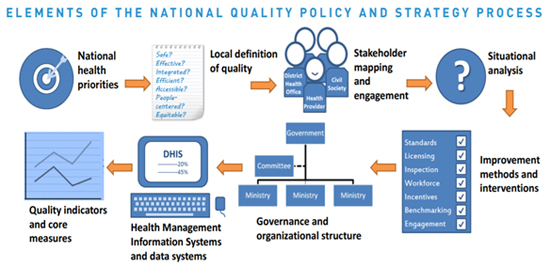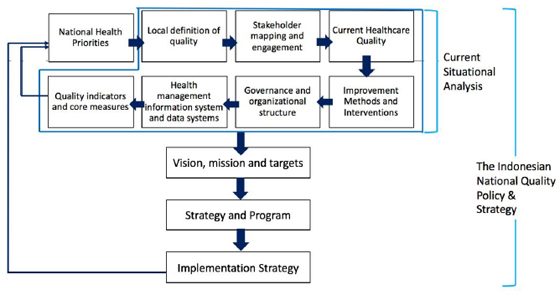Term of Reference
Development of The Indonesian National Quality Policy and Strategy:
A Final Document
Center for Health Policy and Management, Faculty of Medicine UGM, in collaboration with The Directorate of Healthcare Quality and Accreditation, Ministry of Health,
Republic of Indonesia, supported by WHO Indonesia
![]()
Background
Health care quality has been a national and global issue. Global quality improvement in health care has a long history started in the 1900s whereas Indonesia has started its journey since more than 30 years ago. The issue on health care quality continues to be strategic in achieving Universal Health Coverage (UHC), an important component in the Sustainable Development Goals (SDGs). As stated, SDGs has a specific target for UHC, i.e. “Achieving UHC, including financial risk protection, access to quality essential health service and access to safe, effective, quality, and affordable medications and vaccines for all” (WHO, 2015).
Considering the needs for improving health care quality to achieve UHC and SDGs, efforts to improve quality in the entire health system should be supported by a National Quality Policy and Strategy (NQPS). WHO has launched the NQPS handbook which will be used to guide countries in developing the national quality policy and strategy appropriate to their national health policies and planning (WHO, 2017). With the establishment of The Directorate of Healthcare Quality and Accreditation in the Ministry of Health Republic of Indonesia in 2016, there is an urgent need and a golden opportunity to document various quality policies and strategies in each component of NQPS.
In 2017, Center for Health Policy and Management Faculty of Medicine UGM and Ministry of Health developed a situational analysis for all eight elements (figure 1) based on the existing documents, discussion and consultations with stakeholders and policy makers. This project is full supported by WHO.

Figure 1. Modified elements in the development of a Situational Analysis
The document on the current situational analysis of the Indonesian National Quality Policy and Strategy was written in 2017 and it contains the following sections: (1) Global and South East Asia Relevance; (2) Conceptual framework for quality; (3) Definition and dimension of quality; (4) Current situation analysis in Indonesia, consisting of health, health care services, quality of health care services (policy and regulation, stakeholder mapping, improvement
methods and interventions, governance and organizational structure, health management information systems and data, and quality indicators); and (5) Strength, Weakness, Opportunity and Threat analysis (SWOT).
Objectives
- General objective: To develop a document of The Indonesian National Quality Policy and Strategy as a strong foundation for Indonesia to further develop and implement national action plans (Rencana Aksi Nasional) on quality improvement
- Spesific objective: To determine vision, mission, strategy and program for all eight elements through discussion and consultation to a broader policy makers and stakeholders
Methods
The consultant team will work closely and under the guidance of the Directorate of Healthcare Quality and Accreditation, Ministry of Health, to conduct the following serial workshops:
- Workshop 1: Vision, mission and target on health care quality improvement
Vision, mission and target on health care quality will be aligned to the national health priorities and developed by making a consensus with policy makers and stakeholders that we identified on the previous process. The definition and dimensions of health care quality will be included in the consensus. - Workshop 2: Strategy on health care quality improvement
The determination of strategy on health care quality improvement will be done through discussion with policy makers and stakeholders. - Workshop 3: Program on health care quality improvement The determination of program on health care quality improvement will be done
through discussion with policy makers and stakeholders. The proper methods and interventions will be discussed. - Workshop 4: Implementation strategy on health care quality improvement
The discussion on implementation strategy will include the determination of structure and organization for health care quality, health management information systems & data systems, and quality indicators and core measures to support the strategy and program that will be developed on the workshop 2 and 3. This workshop will be done through discussion with the stakeholders and policy makers that we identified on the previous process. - Workshop 5: budgeting and financing for national quality strategy
we will discuss about the budget allocations and calculate the cost for each strategy. the, we will make a five-year budget plan for national quality strategy. we will invite the key staheholders in healthcare and cost of quality experts - Dissemination of The Indonesian National Quality Policy and Strategy final document
A meeting will be held to disseminate NQPS document to all stakeholders from national level to health facilities level in order to better improve national health care quality.
Duration of Work
All activities will be completed within the period of May to March 2019. The
Indonesian NQPS document will be finished in March 2019.

Figure 2. A Conceptual Framework of The Indonesian National Quality Policy and Strategy
Timetable
| No. | Activity | Month | Week |
| 1 | Workshop 1: Vision, mission and target on health care quality improvement | May | 3-4 |
| 2 | Workshop 2: Strategy on health care quality improvement | October | 3-4 |
| 3 | Workshop 3: Program on health care quality improvement | October | 2-3 |
| 4 | Workshop 4: Implementation strategy on health care quality improvement | January 2019 | 1-2 |
| 5 | Workshop 5: Budgeting and Financing for National Quality Strategy | February 2019 | 3-4 |
| 6 | Writing a final document | 1-4 | |
| 7 | Dissemination of NQPS document | March | 4 |
Consultant Team
- Prof. dr. Adi Utarini MSc, MPH, PhD (team leader)
- dr. Hanevi Djasri MARS (co-team leader)
- dr. Novika Handayani (research assistant)
- Deni Harbianto, SE
- Anastasia Noviana (project manager)
REFERENSI
- Handbook For National Quality Policy and Strategy
- National Quality Policy and Strategy: Driving Change for Stronger Health Systems and Improved Health Outcomes
- Survey tool to assess health systems quality improvement and patient safety initiatives
- National Quality Policy and Strategy, WHO Meeting Report
- 2015 National Healthcare Quality and Disparities Report and 5th Anniversary Update on the National Quality Strategy









